News Details
SP2 honors five accomplished social change agents at 2024 Alumni Hall of Fame Ceremony
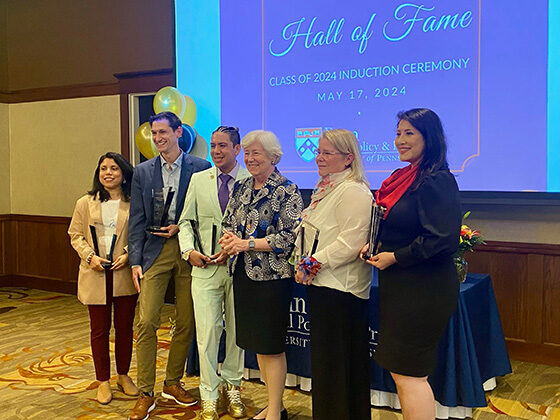
Authored by: Carson Easterly
Photography by: Carson Easterly
Alumni
05/17/24
Five distinguished alumni of Penn’s School of Social Policy & Practice (SP2) were celebrated at the 2024 SP2 Alumni Hall of Fame Induction Ceremony on Friday, May 17. The evening event marked the sixth year that the School has honored alumni through the SP2 Hall of Fame. The event began with remarks from SP2 Dean Sara S. Bachman.
SP2 Director of Alumni Engagement & Annual Fund Donkey Dover, Jr., NPL’15, introduced the 2024 honorees, who are listed below. Representing each of SP2’s five degree programs, they were chosen for professional accomplishments and contributions that benefit the Penn community and the lives of students, colleagues, and clients.
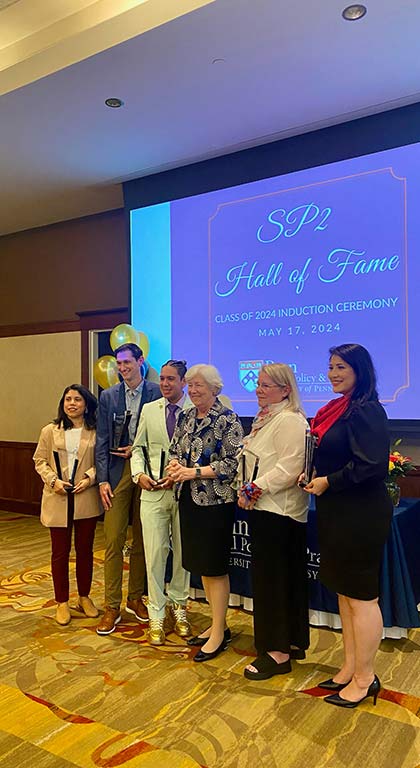
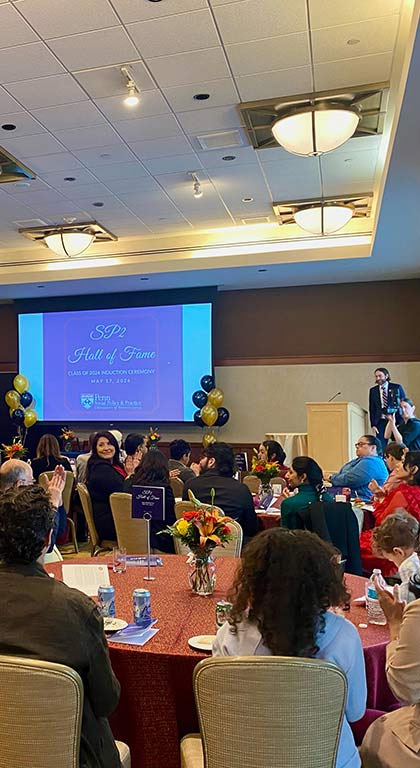
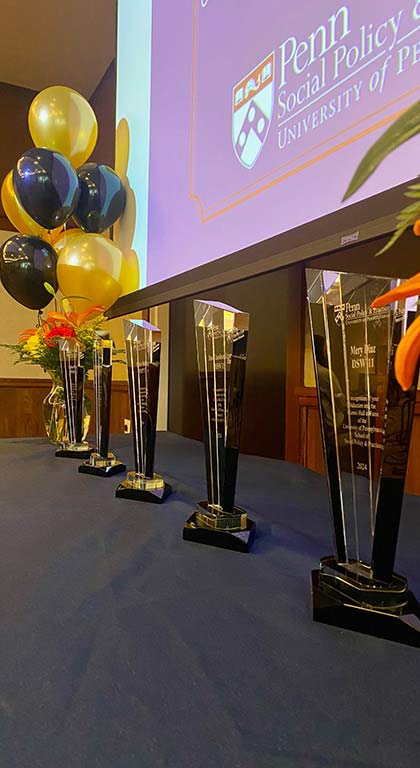
SP2 Alumni Hall of Fame 2024 Inductees
Mery Diaz, DSW
Mery F. Diaz, DSW, LCSW was born and raised in Washington Heights in New York City and is a second-generation immigrant of Ecuadorian and Dominican heritage. Dr. Diaz holds a master’s degree in social work from the Wurzweiler School of Social Work at Yeshiva University and a doctorate in clinical social work from the University of Pennsylvania School of Policy & Practice (SP2). Since 2012, Dr. Diaz has been a faculty member in the Human Services Department at the New York City College of Technology of the City University of New York. She was promoted to full professor in the fall of 2023. She is a licensed clinical social worker who has previously worked with children, adolescents, and families in various settings.
At City Tech, Dr. Diaz teaches courses focusing on child and adolescent health, women’s health, and counseling skills. She serves as the faculty liaison for CREAR Futuros, a peer-mentoring program grant-funded by the Hispanic Federation to support first-year undergraduate Latinx students. Dr. Diaz is also a founding member of City Tech’s Hispanic Serving Institution steering committee and has participated in the First-Year Learning Communities Initiative and Research Lab. Additionally, she holds a residency teaching autoethnographic research at Rutgers University’s doctor of social work program.
Currently, Dr. Diaz serves as co-editor-in-chief of the Sage journal Affilia: Feminist Inquiry in Social Work, which is ranked 14th out of 44 in Social Work journals and 21st out of 44 in Women’s Studies. Her own scholarship focuses on the racialized, classed, and gendered school experiences of young people and their well-being; critical feminist theory and practice; and social justice issues. She is also a co-editor of Narrating Practice with Children and Adolescents (2019) published by Columbia University Press and has published multiple peer-reviewed articles, chapters, and conference proceedings. Dr. Diaz is currently working on a forthcoming text on group work with Oxford University Press. In 2023, she was selected as a Black, Race, and Ethnic Studies Fellow as part of a Mellon Foundation-funded initiative designed to enhance Black, race, and ethnic studies scholarship and teaching. In addition, she is developing a Girlhood Studies curriculum at her institution. Dr. Diaz also serves as the co-chair of the Board of Directors for the Dance Project of Washington Heights and on the Advisory Board of Washington Heights Choir School, two nonprofit arts-based organizations.
Daniel Jacobson López, MSW
Dr. Daniel Jacobson López is a tenure-track assistant professor and incoming Title IX coordinator at Boston University School of Social Work and visiting faculty at Yale School of Public Health. His research examines how sociopolitical systems engage with gay Latino and/or Black sexual assault survivors and the health services provided to them. He has also researched the effects of COVID-19 on people living with HIV/AIDS and most recently, ways to reduce stigma and increase HIV testing for Ghanaian MSM in Ghana.
Dr. Jacobson López was a postdoctoral associate in the Department of Infectious Diseases and Microbiology at Pitt Public Health, where he was selected as a CEED diversity scholar at Pitt Clinical and Translational Science Institute. He was the first-ever Latine and Latin American PhD graduate at the University of Pittsburgh School of Social Work and is the founder of the University of Pittsburgh’s first Latinx graduate student group. In 2020, he was appointed as the inaugural chair of diversity and inclusion for the University of Pittsburgh Postdoctoral Association. He was appointed by the president of San Diego State University to combat gender-based violence on university campuses. He has published in various peer-reviewed journals, including with University of Pennsylvania Provost John Jackson, Jr. and Dr. Antonio García of the University of Kentucky, and has received grants from Boston University and Yale University.
Dr. Jacobson López has a doctoral certificate in Gender, Sexuality, and Women’s Studies from the Dietrich School of Arts and Sciences and a certification from Katz Graduate School of Business at Pitt. He is a former intern with the United Nations Development Programme, a Schweitzer Fellow Alumnus, and a SAMSHA CSWE Doctoral Minority Fellow alumnus. Dr. Jacobson López is a certified sexual assault counselor, a licensed certified social worker, and an anti-bias facilitator. He has received awards from Black Men at Penn and the Center for Hispanic Excellence at Penn. He received his B.A. from Skidmore College.
Matthew Miclette, MSSP
Matt Miclette is the vice president of clinical operations at NeuroFlow, where he is at the forefront of implementing technology-driven infrastructure to support integrated care and population behavioral health at scale. His work is central to the integration of behavioral health within primary care and the development of digital health solutions that serve a wide range of health systems, payers, and the federal government. Additionally, as the co-founder and executive director of Action Tank, Miclette utilizes the expertise of veterans within the community to improve social conditions in Greater Philadelphia.
In his military career as a U.S. Army captain, he treated physical and psychological trauma, earning board certification in mental health nursing. His contributions to suicide prevention innovation were acknowledged when he served as the lead author for NeuroFlow’s award-winning submission to the Mission Daybreak prize, earning national recognition from the U.S. Department of Veterans Affairs.
Prior to his tenure at NeuroFlow, Miclette was involved in policy research at the Leonard Davis Institute of Health Economics at the University of Pennsylvania and served on the Philadelphia mayor’s Opioid Task Force. He holds a bachelor of science in nursing from the University of Vermont and dual master’s degrees in social policy and public health from Penn. He is a 2016 Tillman Scholar and 2022 alum of the George W. Bush Institute Veteran Leadership Program.
Stephanie Rivera-Kumar, NPL
Stephanie Rivera-Kumar is a third-year city and regional planning doctoral student and Fontaine Fellow at the University of Pennsylvania Weitzman School of Design. Rivera-Kumar’s research explores Latinx immigrant populations’ economic, cultural, political, and social impacts on U.S. cities, specifically Philadelphia. Her research has received funding from the Penn Center for the Study of Ethnicity, Race, and Immigration; the Penn Center for Latin American and Latinx Studies; and the Penn Institute for Urban Research. Rivera-Kumar is a research assistant at the Center for Guaranteed Income Research at Penn’s School of Social Policy & Practice (SP2), was selected as a Perry World House graduate associate in 2021 and 2022, and previously served as a teaching fellow at SP2’s Center for Social Impact Strategy.
Before beginning her doctoral studies, Rivera-Kumar worked as a nonprofit professional and social impact strategist for over ten years. Rivera-Kumar is currently a co-chair of the Pennsylvania Immigration and Citizenship Coalition, the treasurer of the University of Pennsylvania Association of Alumnae, a member of the SP2 Master of Science in Nonprofit Leadership (NPL) Program Governance Committee, and a board member of Studio Ludo. From 2021 through 2023, Rivera-Kumar served as one of the co-chairs of the NPL Alumni Association. Rivera-Kumar is also a lecturer for the NPL and Master of Science in Social Policy Programs at SP2.
Rivera-Kumar holds a master of science from SP2’s NPL Program, a master of public administration in international administration and development from the University of Texas at Arlington, a diversity and inclusion certificate from Cornell University, an organizational leadership certificate from the Wharton School and SP2, and a professional fundraising certificate from Boston University. Rivera-Kumar has experience managing over $50 million in grant funding across federal, state, and private sources.
Rivera-Kumar’s dedication to social justice, particularly in supporting low-income and immigrant communities, has earned her numerous accolades, including being a Penn-Birmingham Transatlantic Fellow in 2023, a finalist in the 2022 Greater Philadelphia Social Innovations Awards, an AL DÍA 40 under Forty Honoree in 2021, and recipient of Penn’s Excellence in Social Impact Award in 2019.
Amy Blank Wilson, PhD
Amy Blank Wilson, PhD, MSW, LSW is an associate professor and The Prudence F. and Peter J. Meehan Early Career Distinguished Scholar at the School of Social Work at The University of North Carolina at Chapel Hill. She is also the co-director of the Tiny Homes Village. Dr. Wilson grew up in Riegelsville, Pennsylvania, a small town about 60 miles north of Philadelphia, and worked as a social worker in the child welfare, mental health, and criminal legal systems in Philadelphia and the surrounding metropolitan area for over 10 years. After completing her MSW at Rutgers University, Dr. Wilson began the PhD program at the University of Pennsylvania School of Social Policy & Practice, earning her PhD in social welfare in 2006. Dr. Wilson then completed a NIMH postdoctoral fellowship at the Institute for Health, Health Care Policy, and Aging Research at Rutgers University. Dr. Wilson also met and married her husband Matt while enrolled in her PhD program. They welcomed their first child, Zack, while she was completing her dissertation and their second child, Grace, while she was completing her post-doctoral training.
Dr. Wilson uses her practice experience and research expertise to explore new ways to address the complex, interlocking problems of poverty, homelessness, substance use, and criminal legal system involvement facing many people with mental illness. Her research and scholarship include over 20 funded grants, 60 peer-reviewed articles and book chapters, and 90 conference presentations. She is a national expert in the development and testing of interventions for people with mental illness involved with the criminal legal system. She is also the co-director of the Tiny Homes Village, a demonstration project focused on expanding the continuum of affordable housing options for people with mental illness. In addition to her research, Dr. Wilson enjoys mentoring doctoral students and junior faculty and teaches regularly in the MSW and PhD programs in the School of Social Work at the University of North Carolina at Chapel Hill. She serves as a board member for a backpack food program at her local elementary school and is a member of several advisory boards focused on issues in the criminal legal system. When she is not working or driving her children to sporting events, Dr. Wilson can be found walking her dogs, spending time with family and friends, and trying to convince her family to play pickleball.
People
-
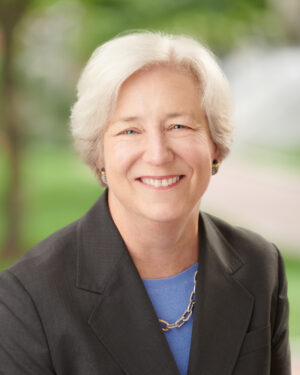
Sara S. Bachman, PhD
Dean
Contact
office: 215.898.5512
fax: 215.573.2099
Email